Top 11 Website Builders in 2026 — Free & Paid

Are you feeling overwhelmed while searching for the top website builders? Well, you are not alone.
Whether you want to build an eCommerce store, blog, portfolio, or news website, website builders are the most creative solution that can help you build stunning websites much faster and in a budget-friendly way.
However, there are tons of website builders in the market, and finding the right one is a complex and time-consuming task because each website builder has its unique use cases, features, and benefits.
Luckily, you don’t have to go through hundreds of options alone.😊
Here, we’ve curated our list of the top 10 website builders (free/paid) based on these benchmarks including:
- Ease of use
- High-end features
- Customization capabilities
- Excellent support
- Affordability
So, if you want to find the right website builder for your business, then this guide is all you need.
Ready to discover a perfect website builder for your business? Let’s explore!
What Are the 11 Top Website Builders in 2026? (Free & Paid)
Here’s a quick comparison between the top website builders:
| Platforms | Best For | Standout Feature | Pricing (approximate) |
| Magento | Building medium to large-sized online stores | Highly customizable | $22,000 – $125,000/year |
| Shopify | Growing online stores | Easy to set up | Starting from $29/month |
| WordPress / WooCommerce | Building medium to large-sized online stores, blog websites, portfolios, and more | High flexibility | Free plan and starting from $4/month |
| BigCommerce | Building medium to large-sized online stores | Built-in features for selling | Starting from $29/month |
| Squarespace | Building beautiful websites | Stunning design templates | Starting from $16/month |
| Wix | Small to medium-sized businesses | AI-powered drag-and-drop builder | Starting from $17/month |
| GoDaddy | Quick and easy setup | Fast website creation | Starting from $9.99/month |
| HubSpot | Combining a website with marketing tools | All-in-one marketing and website tool | Starting from $20/month |
| Webflow | Complete design control | No-code development | Free plan and starting from $14/month |
| Jimdo | Making simple websites quickly | AI-powered site creation | Free plan and starting from $11/month |
Let’s dive into the details of each tool to help you find the right one for your business needs!
1. Magento

Magento is one of the leading eCommerce platforms, and it is specially designed for medium to large-scale businesses looking for an online store with high-level customizations and advanced functionalities.
Magento (Magento Commerce) is also known as Adobe Commerce after its acquisition by Adobe in 2018.
Some key functionalities Magento offers are high-level customizations, advanced analytics, B2B support, multi-store management, third-party extensions, and much more that help build a strong personalized website in the market.
Magento is an open-source framework, and still, it’s one of the most secure and highly compatible platforms.
As it’s an open-source platform, it requires technical knowledge, hence, you might be required to hire a Magento developer to build, manage, and provide support for your website.
Key Features of Magento
- Customer Segmentation
- Advanced Analytics and Reporting
- B2B Functionalities
- Multi-store Management
- Advanced Catalog Search Option
- Third-Party Integrations
- Advanced Marketing and Promotional Tools
Pros & Cons of Magento
| Pros | Cons |
| An open-source architecture | Steep learning curve |
| Numerous built-in features | Higher initial setup and maintenance cost |
| Large Community Support | |
| Mobile-friendly and omnichannel support | |
| Scalable and Global Platform |
Magento Pricing
Magento is an open-source platform, which means it’s free to use.
However, merchants need to spend on license costs, domains, hosting, and other additional things that are needed to build a website. Here’s the estimated Magento pricing with additional costs to consider:
| Magento Open-source | Magento Commerce Pro | Adobe Commerce Cloud | |
| Magento License Cost | $0 | $22,000 – $125,000/year | $40,000 – $190,000/year |
| Hosting | From $100/year | From $500/year | Included in this Plan |
| Development | From $1,800 | From $10,000 | From $10,000 |
| Maintenance | $50 – 100/hour | $70 – $140+/hour | $70 – $140+/hour |
| SSL Certificate | $50 – 300/year | $50 – 300/year | $50 – 300/year |
| Payment Integration | 2.9%+ $0.30 Per transaction | 2.9%+ $0.30 Per transaction | 2.9%+ $0.30 Per transaction |
(*Pricing information may fluctuate over time*)
Learn More:
- What is Magento? — Everything You Need to Know!!!
- Time and Cost to Build Magento Store
- 11 Best Magento Development Companies
2. Shopify
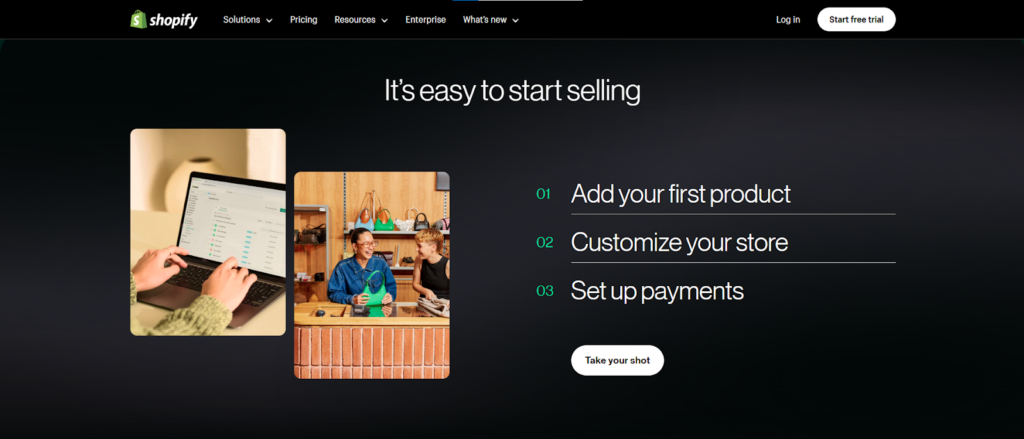
If you’re running a brick-and-mortar store and planning to take your store online, then Shopify is all you need.
It’s a one-stop eCommerce website builder that has everything from drag-and-drop store builder to pre-built customizable templates, third-party app integrations, unlimited product listings, and inventory management to allow retailers to quickly set up and grow their business globally.
One of the standout features of Shopify is multichannel sales and a variety of payment options, which allow retailers to sell their products on multiple channels, including social media platforms, directly and multiple payment options to let customers quickly make buying decisions that overall enhance customers’ shopping experience.
Plus, it offers a point-of-sale (POS) system that retailers can integrate with their offline businesses.
Shopify ensures that business owners get complete control of their stores, and its excellent 24/7 support over the phone and chat will resolve every issue quickly.
Normally, Shopify is easy to get started for building an online store, however, when you want a website that’s built perfectly to match your needs, you’ll be required to hire a Shopify expert.
Key Features of Shopify
- Drag-and-drop editor
- Pre-built customizable templates
- Multichannel support
- 24/7 excellent support
- Third-party app integrations
- In-store POS system
- Advanced reporting and analytical tools
Pros & Cons of Shopify
| Pros | Cons |
| Easy to set up | Limited customization options |
| Extensive apps and themes collection | High transaction fees |
| 24/7 excellent customer support | |
| Sell online and in-person | |
| Built-in marketing and SEO tools |
Shopify Pricing
Shopify has four paid plans:
- Basic – $29/month
- Shopify – $79/month
- Advanced – $299/month
- Plus – $2,300/month
Shopfiy also offers a 14-day free trial on paid plans.
(*Pricing information may fluctuate over time*)
Learn More:
- Shopify Website Development Cost [Complete Breakdown]
- How Much Does it Cost to Migrate to Shopify
- How Long Does It Take to Create a Shopify Store
3. WordPress
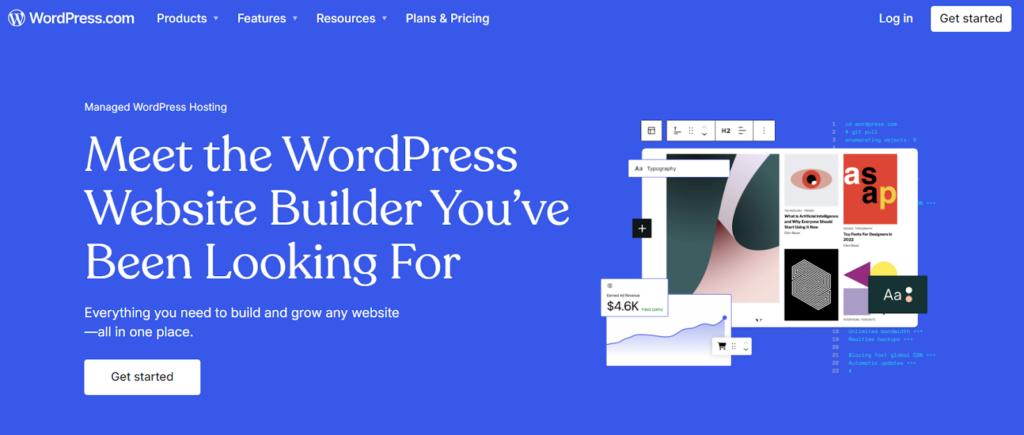
Another popular and easy-to-use website builder is WordPress. It’s a favorite website builder for millions of businesses due to its ease of use, flexibility, and customization capabilities.
WordPress powers 43.6% of all websites globally.
This means that on average, every two out of five websites you visit is built on WordPress.
WordPress is an open-source platform that allows businesses to build any type of website, from Blogging, eCommerce, Portfolio, Travel, and News to Job Boards. All can be easily built with WordPress.
Plus, there are more than 70,000+ third-party plugins available for WordPress for different functionalities, including SEO, marketing, security, inventory, and payment gateways
Currently, WordPress has 12,000+ free themes and 18,000+ paid themes available in different categories. All themes are fully customizable, SEO-optimized, and mobile-responsive, which allows businesses to easily pick any theme as per their business interest and build a website much faster.
If you want to build an eCommerce website on WordPress, then there’s a dedicated plugin called “WooCommerce”, which helps build, run, and manage an eCommerce store in a very simple and straightforward way.
Key Features of WordPress
- Drag-and-drop builder
- Thousands of Pre-built customizable themes
- Thousands of Third-party plugins
- Highly scalable
- Real-time customization
- User-friendly platform
- SEO-optimized
Pros & Cons of WordPress
| Pros | Cons |
| It is a free and open-source platform | Continuous maintenance required |
| User-friendly CMS | Learning curve for all functionalities |
| Thousands of plugins and themes | |
| Mobile-responsive | |
| Highly scalable |
WordPress Pricing
WordPress is an open-source platform, which makes free to use but there are five plans that WordPress offers:
- Free – $0
- Personal – $4/month, billed annually
- Premium – $8/month, billed annually
- Business – $25/month, billed annually
- WooCommerce – $45/month, billed annually
(*Pricing information may fluctuate over time*)
4. BigCommerce
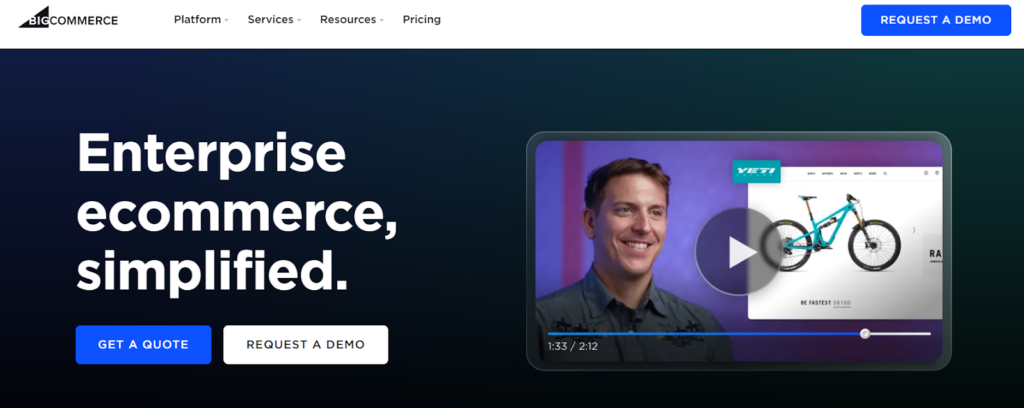
BigCommerce has everything an eCommerce business needs with small to enterprise-level store functionalities.
With advanced customizations, multichannel support, built-in POS, customer segmentation, B2B support, omnichannel selling, 180+ pre-built templates, high-level security, inventory management, and much more, BigCommerce can be your go-to choice.
It’s a feature-rich and powerful eCommerce platform that is easy to use for small to midsize businesses. It has tons of features and excellent 24/7 support to set up your business more easily.
Also, the platform comes with an easy-to-use interface which helps with the efficient management of your online store.
Overall, BigCommerce is worth considering as an option for small to midsize businesses that are more focused on e-commerce sales as it comes with advanced sales features and optimized inventory management to help along the way.
Key Features of BigCommerce
- Unlimited products, file storage, and bandwidth
- Customer Segmentation
- B2B Support
- Multi Storefront
- Headless Commerce Integration
- Cross-channel Selling
- Dropshipping & POD
- Built-in POS
- Marketing Automation tools
Pros & Cons of BigCommerce
| Pros | Cons |
| Multi-channel integration | Limitations in customization and setup |
| No commission or transaction fees | Annual online sales limit per plan |
| Wide range of apps and themes | |
| Impressive security features | |
| Unlimited number of admins and products |
BigCommerce Pricing
It offered four paid plans:
- Standard – $29/month
- Plus – $79/month
- Pro – $299/month
- Enterprise – Custom Quote
BigCommerce offers a 15-day free trial on all paid plans.
(*Pricing information may fluctuate over time*)
5. Squarespace

Squarespace is one of the best website builders, known for its sleek templates, user-friendly editor, and robust eCommerce capabilities.
It has more than 180+ pre-built templates, unlimited storage bandwidth, built-in tools, affordable plans, and third-party integrations.
From blogging, portfolio, and business to eCommerce, all types of websites can be easily built with Squarespace.
One of the unique things about Squarespace is simplicity, which means even a beginner can build a stunning website without any technical expertise required. Also, there’s a dedicated plan for eCommerce, which has all the functionalities required to set up and launch an online store quickly.
However, customization capabilities are limited to this platform. So, it’s only preferred for those businesses that require fast website setup.
Key Features of Squarespace
- Mobile-optimized checkout
- AI tools
- Pre-Built Customizable Layouts
- Squarespace mobile app
- Built-in Marketing and SEO tools
- Passwords and page locks
- Excellent 24/7 support
Pros & Cons of Squarespace
| Pros | Cons |
| Wide collection of themes and templates | No POS Hardware Integration |
| No-code editing capabilities | Limited app integrations |
| Unlimited Storage Space | |
| All-in-one platform with hosting and domain | |
| Excellent customer support |
Squarespace Pricing
Squarespace has four paid plans:
- Personal – $16/month
- Business – $23/month
- Commerce (Basic) – $28/month
- Commerce (Advanced) – $52/month
It also offers a 14-day free trial on all paid plans.
(*Pricing information may fluctuate over time*)
6. Wix
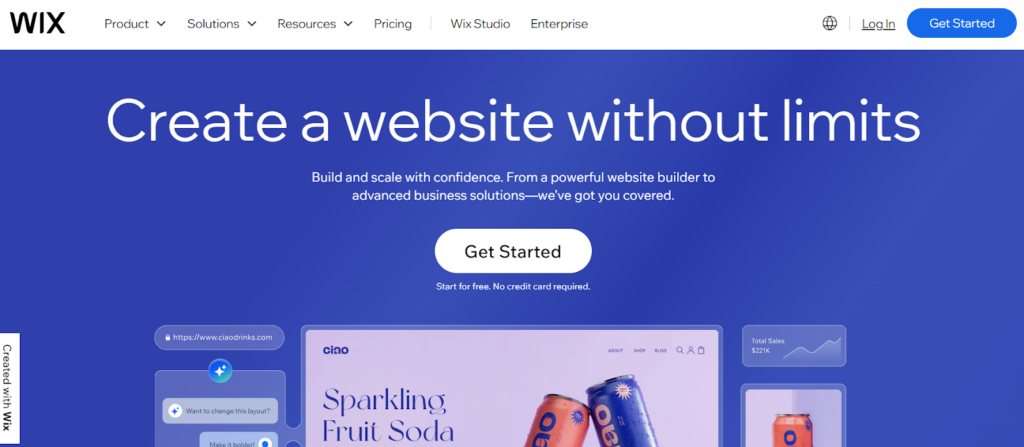
Are you looking for a website builder that provides an all-in-one solution? Introducing Wix.
Wix is a new player in the market but gained huge popularity in a very short time due to its rich functionalities, extremely easy customization options, and beginner-friendliness. With this website builder, you can build a modern, feature-rich website within a few minutes without needing to write code.
Whether you need a blog, portfolio, eCommerce, or company website, Wix has all the resources you need to build it.
It’s trending at the top of website builders, and the reason is the flexibility of building websites at your fingertips.
One standout feature of Wix is Wix’s AI website builder, which allows you to create any type of website with a single prompt. You can tell the chatbot what type of website you need, and within a few minutes – most of the website development process is done.
There are tons of templates and features available that you can easily integrate with your website and make it fully functional and feature-rich as per your business needs.
Key Features of Wix
- Wix AI for quick website development
- Advanced drag-and-drop editor
- Hundreds of customizable themes
- Wix App market for add-on functionalities
- Fully hosted platform
- Super easy to use
Pros & Cons of Wix
| Pros | Cons |
| Massive Template Collection | Slow Loading Times |
| Excellent Drag-and-drop editor | Websites Aren’t Transferable |
| Wide range of Wix app market | Limited customization |
| AI-powered website builder | |
| Automatic site backup |
Wix Pricing
Wix offered four paid plans:
- Light – $17/month
- Core – $29/month
- Business – $36/month
- Business Elite – $159/month
Wix offers a 14-day money-back guarantee on all paid plans.
(*Pricing information may fluctuate over time*)
7. GoDaddy
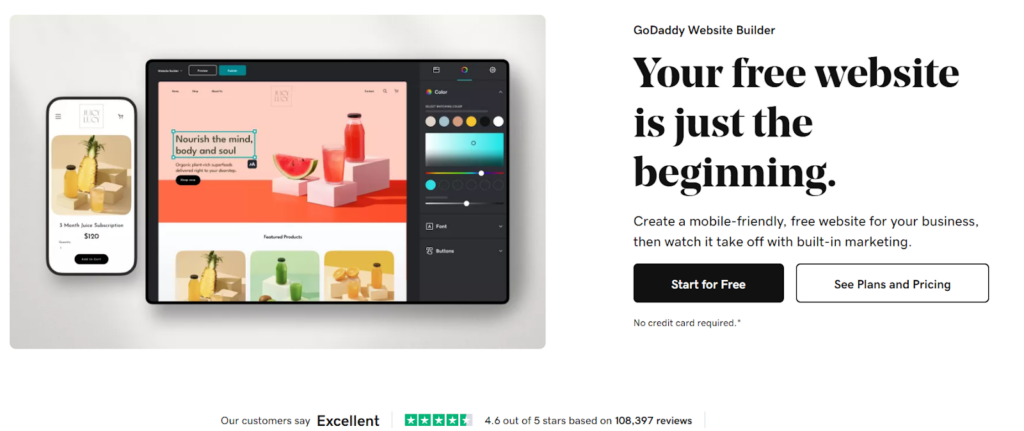
GoDaddy is a globally recognized platform for buying domains, but it also offers website development functionalities for businesses.
It’s the fastest and most cost-effective way for businesses to go online. As GoDaddy has additional functionalities for building websites, then it becomes much more cost-effective for businesses to unlock these functionalities and set up their website.
However, GoDaddy is useful for those who have basic website requirements like blogging or a portfolio without advanced customization
You can simply select from the pre-built templates and make basic customizations. That’s why it’s a get online quickly option for businesses. One unique feature of GoDaddy is AI builder, which allows you to generate your website within a few minutes with basic prompts.
Plus, GoDaddy has a smart dashboard that allows business owners to manage all their operations in one place, from managing orders, payments, and inventory to advanced reporting.
Its 24/7 support and extensive resources allow you to quickly get solutions for queries.
Key Features of GoDaddy
- All-in-one solution for website development
- AI builder
- Smart dashboard
- Excellent support 24/7
- Hundreds of Mobile-friendly themes
- Free professional email
- Built-in marketing tools
Pros & Cons of GoDaddy
| Pros | Cons |
| Easy to use | Lack of advanced customizations |
| Free Business Email, SSL, and Domain | Sometimes poor customer support |
| Super fast website development | Poor eCommerce functionalities |
| Automatic daily backups | |
| 30-day money-back guarantee |
GoDaddy Pricing
GoDaddy has two paid plans:
- Website Builder – $9.99/month
- Ecommerce – $20.99/month
It also offers a 30-day free trial.
(*Pricing information may fluctuate over time*)
8. HubSpot
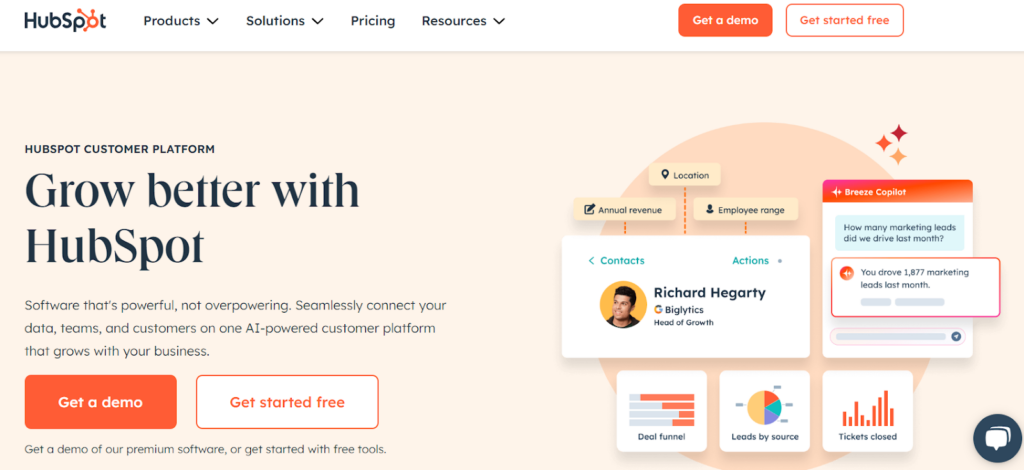
HubSpot is a comprehensive CRM (Customer Relationship Management) system which allows businesses to set up websites and manage entire marketing operations effortlessly.
From setting up a website with a drag-and-drop builder, automating marketing operations, managing social media channels, and generating advanced reports, everything is possible with HubSpot CRM. It can seamlessly integrate with your business and level up system operations, making it easy to export data from HubSpot for analysis or reporting when needed.
It offers hundreds of free/paid customizable templates and 47+ modules (elements) that allow you to build a website which matches your business style. Alternatively, you can use the HubSpot AI builder to share some requirements and preferences, and this platform will design a website per your description.
Plus, it supports third-party integration with platforms like Zapier to add functionalities to automate all workflows and handle everything in one place.
Key Features of HubSpot
- HubSpot AI-powered builder
- Drag-and-drop Editor
- Hundreds of pre-built templates and modules
- Fully integrated CRM tools
- Advanced analytics and reporting
- Workflows automation
Pros & Cons of HubSpot
| Pros | Cons |
| All-in-One Platform | Costly |
| Marketing and sales automation | Limited customization options |
| Real-time lead behaviors notification | |
| High Scalability |
HubSpot Pricing
HubSpot offers three paid plans:
- Starter: $20/month
- Professional: $500/month
- Enterprise: $1,500/month
(*Pricing information may fluctuate over time*)
9. Webflow
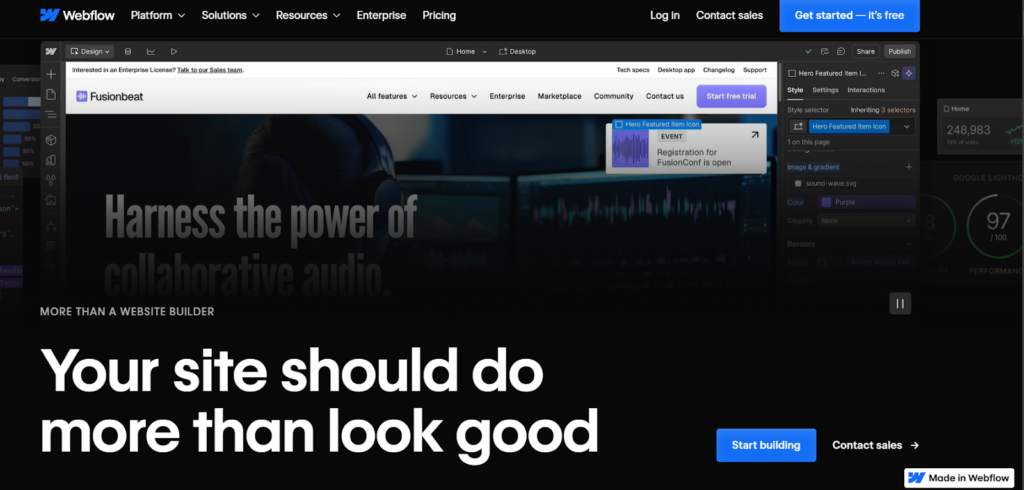
If you’re looking for a free feature-rich website builder, then Webflow is the most popular website builder on our list.
It offers everything from 2000+ pre-built templates to reusable elements, easy to use, and a drag-and-drop editor, which allows websites to be built more easily without coding.
One of the unique stand-out features of Webflow, i.e., the built-in CMS (Content Management System), allows users to create and manage dynamic content for seamless content updates, including blogs, portfolios, and eCommerce content. Plus, SEO functionalities allow users to optimize the website for search engines.
Webflow is easier for those who are familiar with WordPress because it has similar functionalities. So, you can consider it an alternative to WordPress to expand site functionality and be incredibly powerful.
Also, it offers outstanding third-party integration support to add numerous functionalities in one click.
Key Features of Webflow
- Visual Design Tools
- CMS Integration
- Responsive Image Handling
- Role-based access control
- Easy third-party integrations
- Built-in SEO optimization
- Animations Capabilities
Pros & Cons of Webflow
| Pros | Cons |
| Live prototyping | E-commerce Limitations |
| Fast development | Lack of code customizations |
| No-Code Platform | High Learning Curve |
| Built-In SEO | |
| Integrations & App Store |
Webflow Pricing
Webflow offers five plans:
- Free – $0
- Basic – $14/month
- CMS – $23/month
- Business – $39/month
- Enterprise – Custom Quote
(*Pricing information may fluctuate over time*)
10. Jimdo
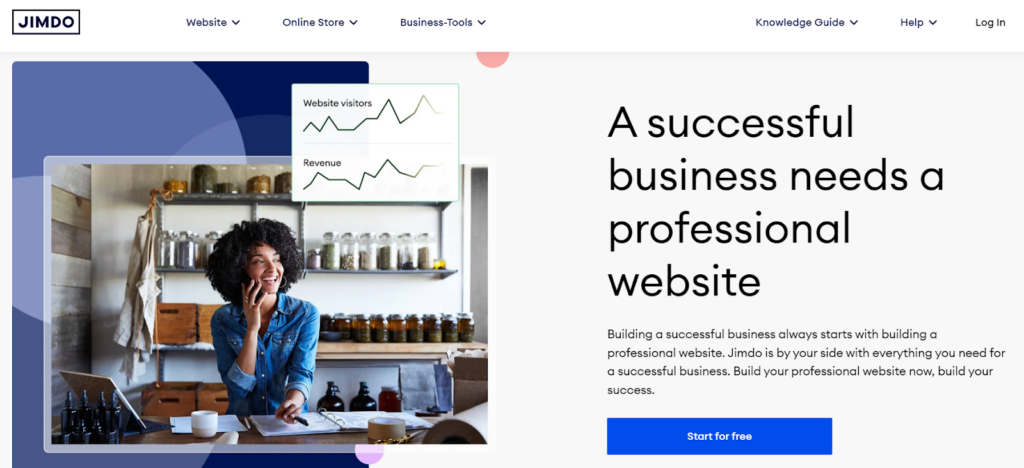
When it comes to finding a platform for freelancers, beginners, and business owners, Jimdo is the most simplistic and complete package of a website builder. With more than 40+ pre-built templates, drag-and-drop editor, add-on integration and SEO functionalities, it makes it easier to build websites.
Jimdo has AI capabilities to generate most of the website structure by asking users simple questions about business and industry.
Also, it offers eCommerce capabilities to quickly launch your online store with templates, payment gateways and social channels like Facebook and Instagram integration.
One thing that stands out, Jimdo, is that you can add functionalities based on needs. For ex – if your website requires booking features, then add-on functionalities are available in Jimdo.
Key Features of Jimdo
- AI-powered website builder
- eCommerce integration
- Blogging Functionalities
- Built-in SEO Optimization
- Mobile site optimization
- Logo Creator
- Drag-and-Drop Website Builder
- Professional customizable templates
Pros & Cons of Jimdo
| Pros | Cons |
| AI builder | Limited template variety |
| Ease of use | Poor customer support |
| Fast Loading Speed | |
| Straightforward Sign-Up Process | |
| Cost-effective |
Jimdo Pricing
Jimdo has three plans:
- Free – $0
- Start – $11/month
- Grow – $17/month
- Business (eCommerce) – $21/month
- VIP (eCommerce) – $28/month
(*Pricing information may fluctuate over time*)
Our discussion on the ten best website builders ends here. Until now, we have discussed the essential factors you must consider when choosing between website builders.
Let’s move on to find the right one that fits your business needs.
6 Things You Consider When Choosing Between Top Website Builders
Here are six things that you can consider to find the right builder for your business:
1. Purpose of Your Website
Are you planning to build a blogging website, portfolio, or fully functional eCommerce online store? Because the type of website you want to build is a big factor in deciding the right website builder for your business. This is because each website builder specializes in different types of website development, and you need to find the one that best fits your chosen website type.
For example, if you want an online eCommerce store, then Shopify is the best platform. So, first, you need to define which type of website you require and whether it matches your business goals and vision. Then, find out which website builder is capable of building the desired type of website for your business.
2. Budget
Another important factor to consider when choosing a website builder is budget. As there are different website builders available with different pricing options, then you need to select which comes under your budget and has all the required functionalities that match your business needs.
There are some free, budget-friendly, and costly website builder platforms available. Make sure to compare their pricing and opt for the one that is under your budget.
However, if you’re planning to build an eCommerce website, then make sure to focus on quality and features rather than cheap website builders because it may be costly in the long run due to technical complexity, performance issues, and maintenance costs. So, pick a value-for-money website builder.
3. Ease of Use
When it comes to choosing the right website builder, the very first thing to consider is usability. You want to build a website that is easily manageable without too much complexity.
Some platforms have too many functionalities and complex options, which takes time to learn and use the website builder.
So, make sure to pick a platform that has less of a learning curve. You should prefer a website builder which allows anyone to build and manage a website smoothly without any technical complexities.
Here are some must-have features you can consider to find out if the platform is easy to use:
- Drag-and-drop editor
- Pre-built customizable templates/themes
- User-friendly interface
- Third-party integration
- AI website generator
For Ex – Wix, Webflow, and Squarespace are the most popular known platforms for easy-to-use and fast website development.
4. Customization Options
Customization is one of the crucial factors that most businesses consider when choosing a website builder. Every platform has pre-built templates and themes, but many platforms lack customization, such as changing the layout, icons, colors, elements, sizes, and shapes, which limits the brand from designing the website according to its business look. So, make sure to choose a platform that offers high-level customization capabilities that match your brand’s look and feel.
5. Support and Resources
It is essential to have strong customer support, especially when you want to build an eCommerce website. So that if any technical issues arise, there’s a strong back-end team available to resolve the issue in minutes. In simple words, you should not choose a website builder that doesn’t offer customer support.
However, not all the website builders are offering excellent customer support. Some offer email support, and some offer AI assistant chatbots with resources like guides, video tutorials, and FAQs, which may not be enough to resolve the technical issue.
So, you should choose a website builder that offers 24/7 phone, email, or live chat support with rich resources to get an instant solution to your issue.
6. Customer Review
One of the final decision-making factors is customer reviews. You need to check each website builder’s customer reviews, how many clients are satisfied, the ratings, and the pros and cons of each builder. There are some trusted platforms where you can check the website builders’ platform reviews, and if you find a platform with a good number of positive reviews, then it might indicate it matches your business needs.
Final Words –
Website builders help all sizes of businesses build websites quickly, from blogging and portfolios to eCommerce online stores; any type of website can be built in minutes with the right website builder.
However, picking the right one can be quite challenging because there are tons of options available. That’s why we’ve listed the top 10 website builders, where each has its own strengths and benefits to match each business’s needs.
Now, it’s your turn to explore these options, find out what’s more important for your website, and choose the right website builder that matches your business needs. We hope this guide helps you explore some of the best website builders, what they offer, and how they can support your journey of building an online presence.
Moreover, if you have any questions, drop a comment or contact our eCommerce experts – We’re here to help you get started!😊






Post a Comment
Got a question? Have a feedback? Please feel free to leave your ideas, opinions, and questions in the comments section of our post! ❤️